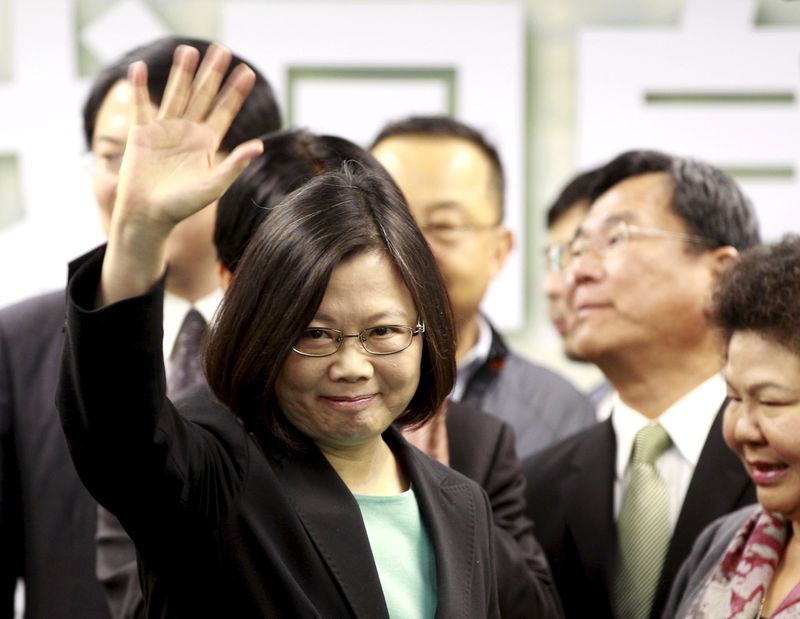By J.R. Wu
TAIPEI (Reuters) - Taiwan's elections are just weeks away with little clarity about how a likely win by a party that traditionally favours independence from China will go down with a neighbour that has threatened force to ensure the island never goes it alone.
Taiwan votes in a new president and parliament in January when the ruling Nationalists (KMT) are expected to be soundly beaten by the Democratic Progressive Party (DPP), supported by youthful voters angered by a perceived economic dependence on the mainland.
The person most likely to be Taiwan's first woman president, DPP leader Tsai Ing-wen, 59, has offered no specific China policy other than broad comments indicating she is willing to engage the Communist rulers in Beijing.
In a book published in 2011, Tsai said she knew opening up to China was unavoidable.
"I know even better that the pace of opening up must stay within Taiwan's grasp and control," she wrote. "Once you lose control of it, China will be like a great magnet, attracting away our capital and talent very fast."
But if the relationship "is always about the problem of unification or independence and ideological argument, there will never be a solution to the cross-strait issue", she wrote, referring to the strip of water between the two sides.
Liu Shyh-fang, in charge of DPP discipline, said the party had given Tsai a "lot of space" to deal with China policy.
"Unless China takes provocative action, Tsai Ing-wen likely won't go in the direction of amending the constitution to change the status quo," she said.
Taiwan bills itself officially as the "Republic of China". Beijing calls itself the "People's Republic of China". China and the KMT believe there is just "one China", but disagree on its interpretation. They say this is the status quo.
The DPP is loathed by Beijing because the party believes the future of Taiwan is for its 23 million people to decide, which Beijing takes to mean independence. The DPP does not subscribe to "one China".
Tsai has said that "a more consistent and sustainable relationship with China will be a core goal" of her government and that she will seek "to establish constructive dialogue with China", without explaining how she will achieve it.
Tsai did not need to elaborate on policy until she becomes president, said people who know her. There was no need to take the risk that voters may object, they said.
Polling results issued on Tuesday by Taiwan's Cross-Strait Policy Association showed the DPP presidential ticket with at least a 30 percentage point-lead against rivals, up by four percentage points from a month ago. [nL3N1341Y6]
The DPP said in a statement its position was "the maintenance of the status quo", which included "first, to maintain the Taiwanese people's democratic way of life and the Republic of China's constitutional order; secondly, peaceful and stable cross-strait relations".
CONTRASTING BACKGROUNDS
During last month's historic summit between Chinese President Xi Jinping and Taiwan President Ma Ying-jeou, Xi told Ma "no force can pull us apart" and warned against any move towards going it alone. [nL3N21316GJ]
Chiang Kai-shek's Nationalists retreated to Taiwan after losing the Chinese civil war in 1949 to the Communists, since when Beijing has never renounced the use of force to bring what it considers a breakaway province under its control.
Xi and Tsai couldn't have more contrasting backgrounds. As Xi tested his mettle within the authoritarian system as party chief of various Chinese provinces, Tsai, in her 30s, became the island's top negotiator for entry into the World Trade Organization, a role that pitted her brains against international experts as Taiwan, recognised as a country by only a handful of others, fought for its diplomatic life.
Tsai formally joined the DPP in 2004.
"She is willing to listen, willing to explain and willing to say what she thinks about things," said Bill Bryson, a member of the American Chamber of Commerce in Taiwan who has known Tsai since the 1980s. "She knows how to negotiate with people. The question is whether people will negotiate with her."
Since Ma came to power in 2008, economic ties between China and Taiwan have improved to the point where last month's summit appeared to symbolise a desire on both sides for continued peace and stability.
"I know Xi Jinping is working very hard to make a circle before she (Tsai) takes office - to get her to stand inside the circle," said DPP grand dame and Taiwan's former vice president Annette Lu.

"That is the trick you have to avoid. There is no such thing as the maintenance of a status quo."